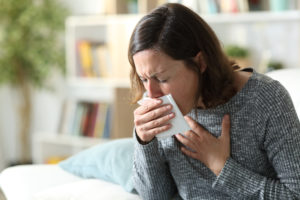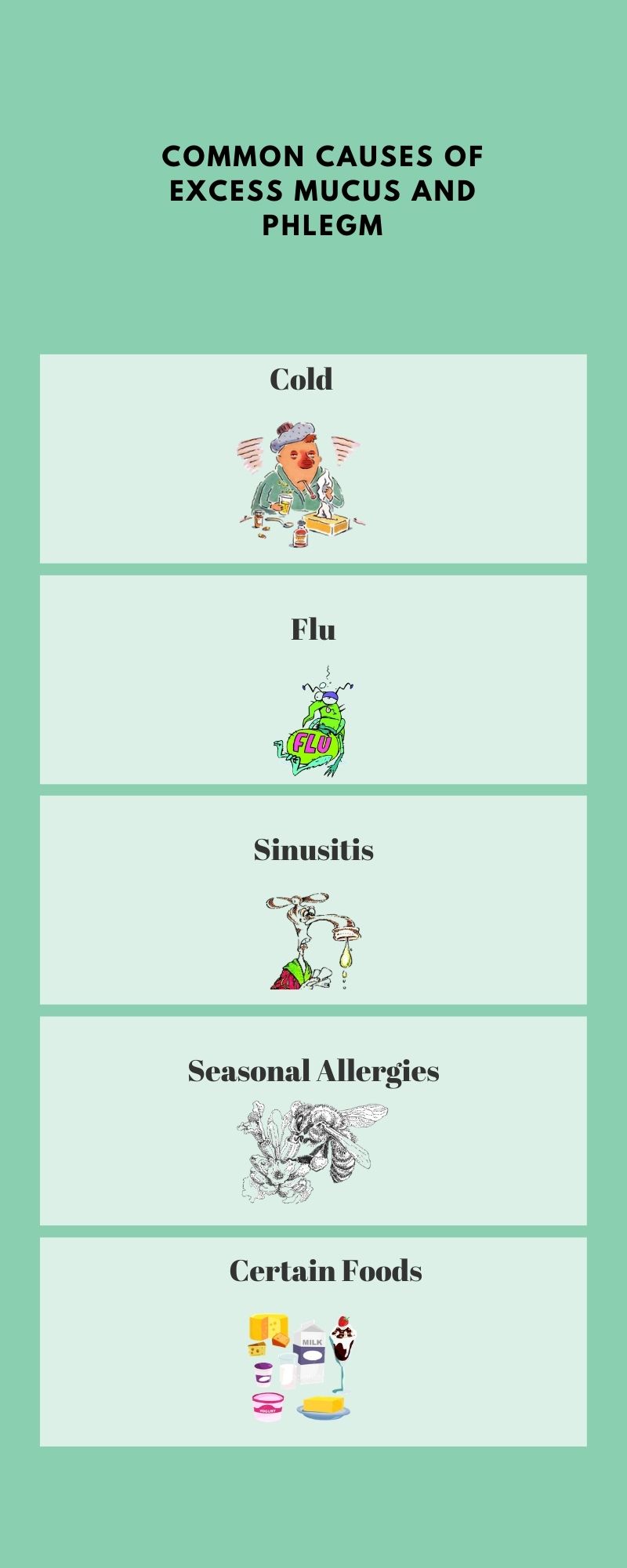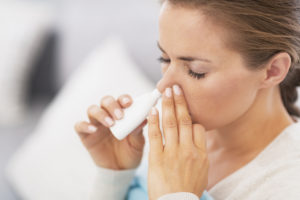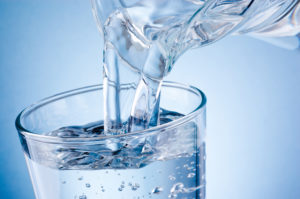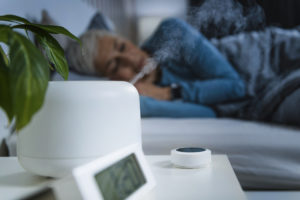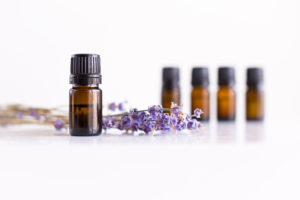How to Get Rid of Phlegm and Mucus in the Throat
If you’re clearing your throat a lot, you’re probably dealing with overproduction of phlegm or mucus in your system.
What is Phlegm and Mucus?
Phlegm and mucus is that stringy, slick, sticky substance your body produces to trap germs and material before they can enter the rest of the body. Mucus also lubricates the organs, tissues, and cavities to prevent irritation and fight infection.
It is produced by mucus membranes that line the cavities and organs of the body.
Your body produces 1 to 1.5 liters (about 4 to 6 cups) of mucus per day.1
The type that ends up in your nasal passages and throat is produced by the membranes lining the cavities and organs of your upper respiratory tract, such as your nose, throat, and mouth. This often makes it difficult to breathe through your nose.
The type you “cough up” is called phlegm, and it’s produced by your lower respiratory tract, i.e., trachea, bronchi, and lungs. Depending on the cause, extra phlegm in your lower respiratory tract often leads to chest congestion. This, too, can make it difficult to breathe.
Though your body is a mucus-producing machine, the only time you’ll notice this substance is when it thickens, causing it to accumulate in and/or drip down the back of your throat.
What Causes Excess Mucus?
Excess mucus production in the lungs, nose, and throat is typically caused by inflammation due to irritation of the membranes, immune system overreaction, or infection.
Here are a few factors that can cause excess mucus in the upper and/or lower respiratory system: 2
- Seasonal allergies, i.e., pollen
- Non-seasonal allergies (rhinitis), i.e. dust mites
- Asthma
- Foods, i.e. dairy, gluten
- Colds and flu
- A dry indoor environment
- Dehydration
- Certain medications
- Smoking
- Pregnancy
- Lung diseases, i.e. cystic fibrosis, bronchitis, pneumonia, chronic obstructive pulmonary disease (COPD)
- Bacterial or viral lung infections
- Throat disorders, i.e. strep throat, laryngitis
- Acid reflux
- Sinusitis or sinus infection
- Neurological inflammation that mistakenly signals the body to make extra mucus or phlegm
Common Solutions to Get Rid of Phlegm and Mucus
Here are a few ways to get rid of phlegm and mucus.
Nasal Sprays
A nasal spray is effective for temporarily clearing nasal congestion caused by colds, allergies, sinus infections, or acute sinusitis.
The three most commonly used types of nasal sprays are steroid, antihistamine, and decongestant.
- Steroid: Reduces inflammation. They are great for soothing allergy symptoms, such as nasal congestion and runny nose. Brand names include Nasacort and Flonase.
- Antihistamine: Blocks the effects of histamine, a compound that causes allergy symptoms like stuffy and/or runny nose. Brand names include Astelin and Patanase.
- Decongestant: Shrinks swollen blood vessels that line the nose relieving nasal congestion. Brand names include Afrin and Sinex.
When using nasal sprays, follow the package direction, and pay particular attention to any cautions. For instance, overuse of decongestant nasal sprays can have a “rebound effect”. This means that your congestion may worsen once you stop using it.
Expectorants
An expectorant drug thins and loosen phlegm from the respiratory tract. This makes your cough more productive, allowing it to clear the phlegm from your chest.
Taking a good expectorant is an excellent way to soothe the symptoms of chest congestion, such as painful cough.
In fact, if you have an illness characterized by a dry, unproductive cough — i.e.. bronchitis or pneumonia — your doctor may advise you to use an expectorant.
There are two main types of expectorants: Guaifenesin and potassium iodide.
The most common expectorant is Guaifenesin, as it is generally well-tolerated by most people. These drugs are available without a prescription. Brand names include Mucinex, Robitussin Chest Congestion.
Expectorants that contain potassium iodide, however, are available only by prescription. This is because iodide is a trace element that can be toxic in large amounts. Thus, doctors must monitor the patient’s usage.
Doctors typically prescribe expectorants that contain potassium iodine for those who suffer from chronic lung conditions, such as COPD or chronic bronchitis.
If you have chest congestion, DO NOT use a cough suppressant drug, or an expectorant that includes a cough suppressant, as it will hinder your ability to cough up the phlegm.
Decongestants
Decongestant medications decrease inflammation in the nose, sinus, and chest. This helps get rid of congestion, helping you breathe easier.
These medications are readily available without a prescription to treat symptoms of cold, flu, and allergies. But because they dilate blood vessels, they can raise blood pressure. For this reason, decongestants are not recommended for those with high blood pressure or heart problems.
Home Remedies to Clear Mucus
In most cases, mucus can be relieved with home remedies. Here are a few of the most popular ways to naturally clear it so that you can breathe easily.
Stay Hydrated
It might surprise you to know that dehydration is a common cause of congestion of your airways and lungs.
After all, an estimated 60% of the human body is composed of water, though this can vary between 45% to 75%.3 Consequently, losing just 3% of your body weight in water can result in dehydration, which can hamper cognitive performance, muscle reaction, and other bodily functions and negatively affect all aspects of your health.4, 5, 6, 7, 8
By the way…your brain is a whopping 80% to 85% water, so even slight dehydration can make cognitive tasks difficult.9
Dehydration can also make mucus thicker and more noticeable.
The solution?
Drink more water!
To stay hydrated, experts recommend that women drink 9 cups of water per day and that men drink 13 cups. If you’re sweating at times during the day, i.e. while exercising or exerting yourself outside on a hot day, you should drink more than the recommended minimum to replace the water you lost.10
Try to drink plain water as much as possible. But you can also increase your fluid intake by drinking other liquids. Keep in mind, though, that caffeinated coffee has a diuretic effect resulting in loss of fluids.
You can also increase your water intake by eating hydrated fruits and vegetables. For example, watermelon, cucumbers, and iceberg lettuce are over 90% water!
If you have any medical conditions, however, see a doctor before significantly increasing your water intake. Some health conditions make it necessary to limit your fluids.11
Use a Humidifier
A humidifier is a machine that adds water vapors to the air. This moisturizes your nose, throat, and lungs, so there is no need for your body to produce extra mucus.
Using a humidifier is a great way to prevent or get rid of phlegm and mucus.
There are 5 main types of humidifiers:
- Warm mist
- Cool mist
- Ultrasonic
- Evaporative
- Vaporizers
Though all of them moisturize the air, they each have features that might be better suited to your needs than the others. For instance, vaporizer humidifiers usually allow you to add inhalants to the water to help break up congestion.
Ultrasonic, evaporative, and vaporizers also typically include warm and cool mist options in the same unit.
Essential Oils
Essential oils are concentrated oils derived from plants.
Ancients used essential oils for medicinal purposes.
And it seems they have never gone out of style, as they are currently used in alternative healing practices, aromatherapy, and skincare. These oils can be used in diffusers, incense sticks, and rubbed on the body.
Consider this: the global market value of essential oils is expected to grow from $17 billion USD in 2017 to about $27 billion by 2022.12
There is even limited scientific studies attesting to the benefits of essential oils.
Essential oils said to be best for mucus and phlegm include:
- Eucalyptus
- Peppermint
- Lavender
- Rosemary
- Rose
Make sure you use 100% pure essential oils, as others are often diluted with less expensive ingredients.
Take SANE Vitaae!!!
Your brain controls every function in your body, including mucus and phlegm production. That is, neurological inflammation can mistakenly signal your body to produce more of this sticky goo.
And it’s not only more common than you might think, but the symptoms of chronic brain inflammation are often vague and non-specific.
The solution?
SANE Vitaae!!!
SANE Vitaae is the wildly popular breakthrough solution that you’ve been looking for. It contains clinically proven ingredients that soothe brain inflammation, indirectly helping manage your body’s mucus production.
And the easy-to-swallow capsules make it EASY to take, too!
Click here to learn more about Vitaae and to place your order now while supplies last!
References
1- Stöppler M. What Is Mucus? MedicineNet. Medically Reviewed on Apr 1, 2021. Accessed May 14, 2021. https://www.medicinenet.com/what_is_mucus/article.htm
2- Vilímovský M. How to get rid of phlegm (excessive mucus) in throat? Detailed guide to medical and home remedies, symptoms and causes. Medlicker. Sep 19, 2016. Accessed May 14, 2021. https://medlicker.com/1169-mucus-in-throat#:~:text=Causes%20of%20excessive%20mucus%20production%201%20Post%20nasal,the%20throat.%203%20Throat%20mucus%20in%20children.%20
3- Sissons C. What is the average percentage of water in the human body? MedicalNewsToday. May 27, 2020. Accessed May 14, 2021. https://www.medicalnewstoday.com/articles/what-percentage-of-the-human-body-is-water
4- Adan A. Cognitive performance and dehydration. J Am Coll Nutr. 2012;31(2):71–8.
5- Benton D, Jenkins KT, Watkins HT, Young HA. Minor degree of hypohydration adversely influences cognition: a mediator analysis. Am J Clin Nutr. 2016;104(3):603–12.
6- Adan A. Cognitive performance and dehydration. J Am Coll Nutr. 2012;31(2):71–8.
7- Magee PJ, Gallagher AM, McCormack JM. High prevalence of dehydration and inadequate nutritional knowledge among university and club level athletes. Int J Sport Nutr Exerc Metab. 2017;27(2):158–68.
8- Savoie F-A, Kenefick RW, Ely BR, Cheuvront SN, Goulet EDB. Effect of Hypohydration on muscle endurance, strength, anaerobic power and capacity and vertical jumping ability: a meta-analysis. Sports Med. 2015;45(8):1207–27.
9- Sissons C. What is the average percentage of water in the human body? MedicalNewsToday. May 27, 2020. Accessed May 14, 2021. https://www.medicalnewstoday.com/articles/what-percentage-of-the-human-body-is-water
10- WebMD. How Much Water Should I Drink Daily? Nourish by WebMD. Accessed May 14, 2021. https://www.webmd.com/diet/how-much-water-to-drink#1
11- WebMD. How Much Water Should I Drink Daily? Nourish by WebMD. Accessed May 14, 2021. https://www.webmd.com/diet/how-much-water-to-drink#1
12- Ridder M. Essential Oils Market Worldwide – Statistics & Facts. Statista. Dec 2, 2020. Accessed May 14, 2021. Essential Oils Market Worldwide – Statistics & Facts


